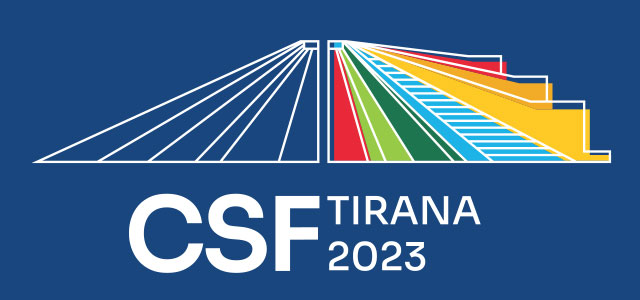Strengthening Regional Security Cooperation in the Western Balkans: Insights from Three Key Consultation Meetings

As part of the preparations for the 2023 Tirana Civil Society and Think Tank Forum, the Kosovar Centre for Security Studies (KCSS), in collaboration with the Open Society Foundations - Western Balkans (OSF-WB), ELIAMEP, and CDI, has orchestrated a series of virtual meetings. These meetings have brought together security experts from the Western Balkan countries to discuss matters of Security and Geopolitics, with the aim of providing insights into the intricate landscape of regional security cooperation in the Western Balkans.
Against the backdrop of pressing challenges, the discussions provided a pragmatic platform for participants to dissect and deliberate potential pathways toward greater cooperation and stability in our region, which has yielded a series of recommendations to bolster security ties within the region.
At the core of the discussions lay the issue of trust, understanding, and reconciliation. Participants recognized that building a foundation of trust and fostering understanding among different ethnic groups in the region are essential prerequisites for successful regional cooperation. Lack of reconciliation and continued bilateral disputes especially between Kosovo and Serbia are a vital hindrance for regional security cooperation in the Western Balkans. Kosovo remains largely unintegrated in key regional cooperation initiatives, and this undermines the overall regional security cooperation.
Uniting Against External Influence. The influence of Russia in the Western Balkan - especially after the war in Ukraine - loomed large, however, discussions unveiled a positive trend, Western pressure had managed to weaken Russia's impact. This encouraged the idea that unity among Western partners can play a pivotal role in mitigating external malign interference and ensuring the region's stability. Among the primary challenges deliberated during the consultations with the security experts of the Western Balkans meetings was the menace of disinformation and malign foreign influence, primarily driven by organized corruption and external actors such as Russia. Recognizing the threat this posed to the Euro-Atlantic integration process, attendees stressed the importance of enhancing media resilience and countering disinformation. This involves not only bolstering the capacity of media organizations to withstand manipulation but also fostering critical media literacy among the population to discern fact from fiction.
Infrastructure Development projects as a weak point. Concerns surrounding the financial implications of China's infrastructure projects resonated deeply. The emphasis was on measured progress, urging governments and the EU to insist on transparency and accountability to prevent the region from falling into a cycle of unsustainable debt.
Organized corruption and alignment with EU Regulations. The consensus in favor of aligning Western Balkan governments with the EU's investment screening regulations was a central pillar of the discussions to fight organized corruption and corrosive capital. Seen as a safeguard against undue external influence, this alignment underscores transparency and ensures that foreign investments align with the region's long-term interests. To address the pressing concerns surrounding corrosive capital in the Western Balkans, it is imperative to extend the scope of analysis to encompass investments tied to politically exposed persons and organized crime networks.
Building upon the anti-corruption pledges put forth by the Berlin Process at the 2018 London Summit, there is a pressing need to evaluate their implementation status and adapt them to address emerging risks related to the connectivity agenda, particularly concerning large-scale infrastructure projects. This adaptation should encompass strategies to counter corruption vulnerabilities linked to such projects.
Fostering Reconciliation Efforts. Drawing inspiration from the positive outcomes of reconciliation programs in Northern Ireland, the notion of replicating this success within the Western Balkans garnered attention. Suggested by participants, the establishment of similar initiative by the European Commission, supported by allocated funds, could serve as a catalyst for enhancing cultural understanding, historical awareness, and regional collaboration.
Strengthening Media Resilience. With disinformation emerging as a significant challenge, discussions veered toward the pressing need to cultivate media resilience. Proposals highlighted the importance of supporting media literacy initiatives, which could empower citizens to discern between factual reporting and misleading information. This strategy aligns with the objective of countering external efforts to undermine regional unity.
Navigating CFSP Alignment. In line with acknowledging the challenges faced by governments that align themselves with the EU's Common Foreign and Security Policy (CFSP), a consensus emerged on the necessity for increased support. As these governments transition towards closer integration, the proposal suggested extending financial and technical assistance to help mitigate potential economic strains from alignment with the CFSP. The specter of external interference is driven by factors such as organized corruption and organized crime. The discussions pivoted toward strategies to tackle this challenge, and participants underscored the need for media resilience and dismantling misinformation.
Acknowledgment: Kosovar Centre for Security Studies (KCSS), expresses its appreciation to members of the core group of the Thematic Working Group (TWG) on Security and Geopolitics Arjan Dyrmishi, Lejdi Dervishi, Milica Kovačević, Misha Popovikj, Nermina Kuloglija-Zolj, and Stefan Vladisavljev, as well as to Dr. Sonja Stojanović Gajić and Igor Novaković, for their significant contributions during the consultation process.
